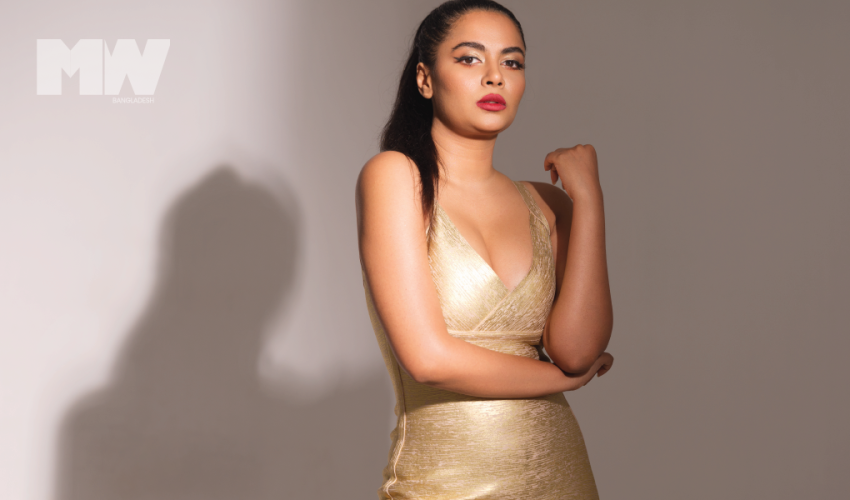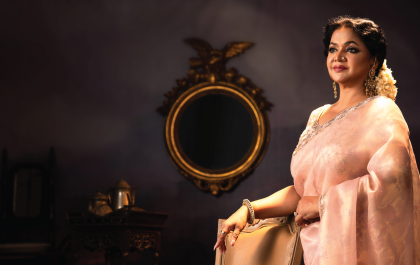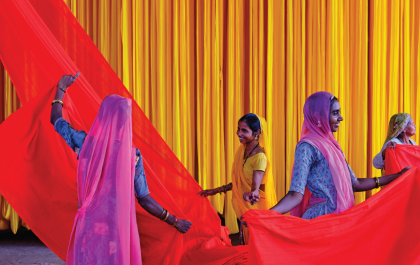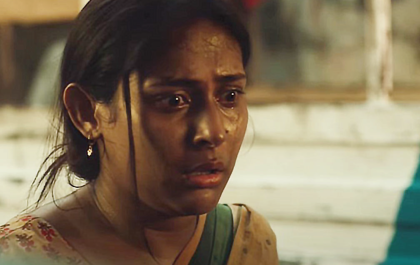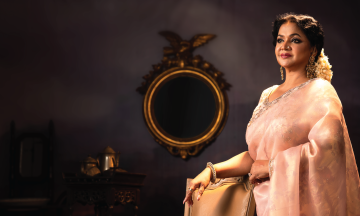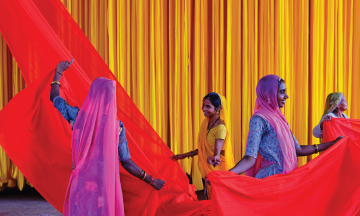From solo traveler to cultural ambassador for her country, Priota Iftekhar has had a remarkable journey
Anika Chowdhury
With nothing but a handbag, a few dollars, and the Bangladeshi flag, she travelled by herself to Sri Lanka, becoming an inspiring figure for ordinary girls from our conservative society who continue to face countless barriers to simple acts such as solo travel. However, Priota Iftekhar is anything but ordinary. Widely celebrated as The Flag Girl, Priota is a dynamic figure whose passion for travel, cultural exchange, and social activism has propelled her into the international spotlight.
After losing her father and being raised by a single mother, it didn’t take long for Priota to realize she needed to stand up for her rights, no one else would advocate for her. Her identity as The Flag Girl was born not out of a desire for recognition but from a spontaneous act of carrying the Bangladeshi flag with her on her travels, symbolizing her commitment to raising awareness and sparking dialogue on women’s rights to travel freely.
Emboldened by her initial success, Priota’s resolve only strengthened. Initially, working as an actor and model, Priota was crowned Miss Culture Worldwide in 2018, a title that not only highlights her as a cultural ambassador but also as a pioneer from Bangladesh in the international pageant arena.

Her advocacy work, particularly using the Bangladeshi flag to champion women’s right to travel underscores her commitment to social causes and women’s empowerment. Her journey in the pageant world culminated with her win at Miss Culture Worldwide 2018, after which she shifted her focus towards broader global issues.
Now pursuing a second Master’s degree in strategic communication studies in Australia, Priota Iftekhar is busier than ever. MWB caught up with her to know what is keeping her occupied these days.
Your grandmother Nurjahan Begum was a pioneering female journalist in Bangladesh and the founder of women’s weekly Begum. Did she influence your path towards advocacy and empowerment?
Both my grandfather and grandmother were journalists and they have been the biggest inspirations in my life. My grandfather worked at The Daily Ittefaq, and he was the founder of Kochi Kachar Mela. All his advocacy and movements were focused on children.
And my grandmother was the first female journalist in our country as well as the editor of Begum magazine. She was very vocal about women’s rights and an observant person. My grandfather travelled the world with the children of Kochi Kachar Mela and spread the word of our culture everywhere.

Once, I attended a fair in the UAE and saw the picture of my grandfather with Bangabandhu Sheikh Mujibur Rahman in a Bangladeshi stall. I was proud and shocked at the same time. The entire background of my grandfather was written there – how he had travelled the world, especially with the pictures from our Liberation War in 1971, and attended a conference in Russia – seeing the picture and achievements of my grandfather on a global platform left me speechless. I felt overwhelmed and inspired.
My grandfather and grandmother raised the bar exceptionally high for me, and I have been trying to follow in their footsteps.
From a very young age, I felt inspired by both my grandfather’s and grandmother’s commitment to societal change, each in their unique domains, and it highlighted the importance of advocacy, education, and empowerment. Their legacies not only inspire my advocacy work but also remind me of the profound impact one can have through dedication and courage.
The moniker ‘The Flag Girl’ is powerful. How did this identity come about and what does the Bangladeshi flag symbolize to you in your advocacy?
The Flag Girl happened very randomly and I didn’t plan it at all. I travelled to Sri Lanka with nothing but our country’s flag – thinking if I raise the flag for a cause, it would get people’s attention. This is how The Flag Girl was born.
Then again, I don’t want to score a world record and this is why, I avoid the question: “How many countries have you travelled to?” If I go somewhere, I want to experience everything the country has to offer. I have travelled to Sri Lanka 27 times and wish to go there again. Australia is my fifth continent and I am keeping my eyes open for more destinations.

Additionally, by promoting events like the Shakrain Festival and various tourism festivals, The Flag Girl intends to spotlight Bangladesh’s unique traditions, art, and landscape on the global stage. At the core of The Flag Girl’s mission is the unwavering commitment to women’s empowerment.
I aim to inspire and empower women to embrace travel as a means of self-discovery, learning, and asserting their independence. The flag is a symbol of solidarity, signalling women, regardless of their background, have the right to explore, experience, and engage with the world on their own terms.
In your other interviews, you mentioned that your family was initially reluctant to let you travel alone. So, have your personal experiences driven your mission?
My mother was my best friend. Initially, she was hesitant to let me travel alone and it was primarily because she was being manipulated by a few conservative and narrow-minded people. She stopped me from travelling and said I could travel as much as I wanted but only after my marriage. The boys in our society can easily travel without any problems but girls cannot. Why so? I didn’t like this and so I kept running away from my home again and again.
I wanted to go to Sri Lanka to attend a cricket match as I was selected for the International Visitor Leadership Program (IVLP), but my family didn’t let me. My passport was confiscated. Somehow, I got a hold of my passport, stole a handbag, put a Bangladeshi flag in it and went straight to the airport. Even there, the police grilled me with questions, but not once did I lose my determination or confidence. And perhaps, it was our country’s flag that helped me to overcome this barrier.
Later on, my mother came around and decided to travel the world with me. We travelled to many places and did scuba diving together – eventually, she realized life is beautiful when you have an open mind.
The journey wasn’t easy. The first person who wants to be a pioneer, who wants to make a change, always tolerates the harshest treatment.

You studied acting and filmmaking at Anupam Kher Acting School in India. Do you see yourself working in media any time soon?
If any good opportunity presents itself to me, I would definitely consider it. However, living abroad is not a piece of cake and along with it, I have many responsibilities to fulfil now – towards my family, studies, and career. I am willing to work in the media but sadly cannot manage the time to do so.
Winning the title of Miss Culture Worldwide in 2018 was a significant achievement. How has this title helped you in advancing your advocacy for women’s rights and travel?
I felt a little overwhelmed after winning the title. I had to meet the speaker, mayor, and numerous diplomats. It was not easy. You need to be aware of their roles and what sort of relationship they have with us.
Of course, any title adds more value to your personal brand and people take you far more seriously than before. I am grateful for the training I have received and now, I want to impart my knowledge and educate other girls, who don’t have the opportunity to receive such training.
I have taken several initiatives through The Flag Girl – for example, I worked with girls at the grassroots and have been advocating for women’s rights to travel. But I was deeply saddened by the fact that not only can girls not travel, they are not even allowed to go out alone after evening. I took 20 steps back and started from the beginning with my Dour Jhap project. I have created sports centres all over the country for girls, especially for those who are studying in madrasas.
I want to break the stereotype and encourage girls to go out and engage in sports, just like the boys from a very young age.
You would be surprised to see how many madrasa teachers, parents. and locals have supported our campaign. They were never told that similar to boys, girls equally require physical fitness. We were pursuing this movement during the Covid-19 pandemic when physical fitness was necessary more than ever. It is mandatory for every human being to be physically active. The more a child is involved with sports, the more he or she will develop essential qualities like leadership, risk-taking, and strategic planning.
By nature, women play it safe and look for safety. Whereas boys are always the risk-takers and this is why most of the time, they end up being entrepreneurs. We need to change this narrative and this is my goal. Nowadays, there are many international conferences and seminars open for girls and all, they have to travel to attend these. This is why I encourage girls to travel with a purpose.

You are currently undertaking your second Master’s degree in Australia. Could you tell us more about your field of study and why you chose it?
Whatever you going to do, you will always need communication. I worked at the foreign and health ministry and during the pandemic, I noticed there were tonnes of misinformation and people could not communicate properly.
So, realizing the importance of communication, I decided to pursue my second Master’s degree in strategic communication studies. I received the Postgraduate Academic Excellence International Scholarship in Australia and decided to move here.
What are some of the books you are currently reading?
I don’t get much time to read; however, there are plenty of books I plan to read. One of them is a book written on the life of Shah Rukh Khan. I am a very practical person and preparing myself as a property and e-commerce investor. So, I have a list of books to read on these topics.
At this point in my life, I don’t have the time to read romantic books. Instead, I read books on self-development and investment.
What advice would you give to young women in Bangladesh and around the world who aspire to break barriers and travel independently?
I think most girls perceive themselves as damsels in distress and they need to change this mentality. You have to learn to stand up for yourselves. It is very important because if you don’t, no one else is going to do that for you. Most importantly, you need to have a strategy if you want to travel independently. You need to have a certain amount of savings and make sure that the destination changes you.
Looking ahead, what are your long-term goals both in your career and advocacy work?
Eventually, just like every other human being, I want to settle down and become financially solvent. I wholeheartedly look forward to motherhood. Right now, I am moving ahead in my life strategically and as I am a very practical person, I don’t want to give up on my dreams, have a house of my own, and ensure that I have enough stability in my life.




